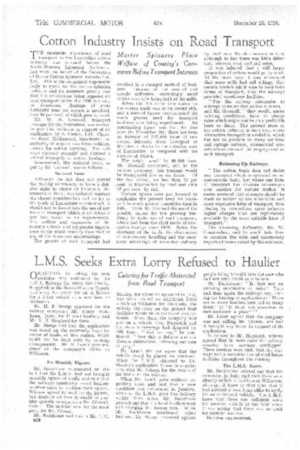Cotton Industry Insists on Road Transport
Page 24

If you've noticed an error in this article please click here to report it so we can fix it.
Master Spinners Place Welfare of Country's Commerce Before Transport Interests
THE enormous importance of road transport to the Lancashire cotton industry was stressed before the North-Western Licensing Authority, last week, on behalf of the Federation of Master Cotton Spinners' Associations, Ltd. This is the recognized responsible ,body to speak for the cotton-spinning industry and its members greatly fear that the restrictions being imposed on road transport under the 1933 Act may
• be disastrous. Haulage of some . 3,000,000 tons per annum is involved, over 80 per cent, of which goes by road.
Mr. W. H. Greenall, transport manager for the Federation, was invited to give this evidence in support of an application by S. Cusick, Ltd., Chamber Road, Hollinwood, Manchester, for authority tO acquire two 5-ton vehicles, mainly for cotton carrying. The railways opposed strongly and claimed a virtual monopoly in cotton haulage.
Summarized, the national issue, as put by Mr. Greenall, was as follows:— National Issue.
Although the Act does not permit the trading community to have a definite right to choice of transport, the interests of the cotton industry warrant the closest consideration and, so far as the trade of Lancashire is concerned, it should not be forced into the use of any form of transport which it considers is not best suited to its requirements. The welfare and expansion of the country's trade is of far greater importance to the whole country than that of any of the transport undertakings.
The growth of road transport had resulted in a changed method of business. Because of the assured and speedy deliveries, exceedingly small stocks were nciw being held at the mills. When the Act came into operation the cotton trade was at its lowest ebb, and a mass of figures demonstrated the much greater need for transport facilities now being experienced. An outstanding figure was that for this year (to November 28); there has been an increase of 307,000 bales of raw cotton delivered from Liverpool or Manchester docks to the spinning area of Lancashire, as compared with the number of 1933-4.
The weight would be 68,000 tons, Mr. Greenall continued, and in the various processes, this tonnage would be transported five or six times. Of the raw cotton, no less than 73 per cent, is transported by road and only 27 per cent, by rail.
Various figures were put forward to emphaske the present need for transport in much greater quantities than in 1934. Then Mr. Greenall discussed the possible causes for the growing tendency to make use of road transport, which had been the chief mode of rawcotton haulage since 1920. Rates, the shortness of the hauls, the elimination of unnecessary handling and the enormous advantage of same-day delivery by road were the determining factors, although to-day there was little difference between road and rail rates.
• It was inferred that a still larger proportion of cotton would go by road. At the same time it was mentioned that some mills had rail sidings, that • certain traders felt it wise to keep both • forms of transport,. that the railways provided warehouse facilities.
"For the railway companies to attempt to secure this cotton business," said Mr. Greenall, "they would, under existing conditions, have to charge rates which might not be on a profitable basis to them. The present state of the cotton industry is such that where alternative transport is available, which has not to perform so many terminal and cartage services, commercial considerations demand the employment of such transport.
Bolstering Up Railways.
" The cotton trade does not desire any transport which is operated on an uneconomic basis, but where one form of transport has obvious advantages over another for certain traffics, it seems unsound that attempts should be made to bolster up the unsuitable and more expensive form of transport, thus placing by compulsion upon industry • higher charges than are legitimately available by the more suitable form of transport."
. The Licensing Authority, Mr. W. Chamberlain, said he would take time to consider the wide and enormously important issues raised by this evidence.












































































